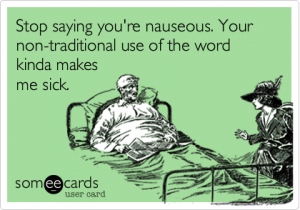And once again, we’re back to the silly quirks of English. By now I’ve made quite a few references to the oddities of the English language in a series of “four words” posts on my blog, from words that are often used incorrectly to words that used to mean something different to words that don’t mean what most people think they do. Now for today’s post, I thought I’d have some fun by discussing words that are technically supposed to mean one thing but have been mutated into a different, more common definition by modern usage (although their original meanings are still defended by advocates of traditional, “proper” English).
So just for fun, here are four words that are commonly thought to mean one thing but are actually supposed to mean something else. Enjoy!
Fortuitous should mean “by chance”, not “lucky”
 It’s no wonder how the word “fortuitous” made it onto this list. It has the root fort built into it, so it must be synonymous with “fortunate”, right? That seems to have been the general consensus when the definition “happening by a lucky chance” first came about, but in fact, this word was originally supposed to have a neutral connotation, as in “happening by accident”. The informal positive definition seems to be more common nowadays, however, and this usage has become something of a synonym for “lucky” in modern English (albeit still frowned upon by traditionalists). So if someone tells you about a “fortuitous” event, it was most likely a fortunate occurrence, but the important thing to take away from the story is that it happened by chance!
It’s no wonder how the word “fortuitous” made it onto this list. It has the root fort built into it, so it must be synonymous with “fortunate”, right? That seems to have been the general consensus when the definition “happening by a lucky chance” first came about, but in fact, this word was originally supposed to have a neutral connotation, as in “happening by accident”. The informal positive definition seems to be more common nowadays, however, and this usage has become something of a synonym for “lucky” in modern English (albeit still frowned upon by traditionalists). So if someone tells you about a “fortuitous” event, it was most likely a fortunate occurrence, but the important thing to take away from the story is that it happened by chance!
Momentarily should mean “for a moment”, not “in a moment”
Anyone who has ever taken public transportation such as a train or an airplane is likely to have heard at least once a phrase along the lines of “We will be leaving momentarily.” It is generally accepted that “momentarily” indicates something that will happen “in a moment”, and this is obviously what pilots, conductors, and drivers mean to tell their passengers when their trip is delayed. But “momentarily” traditionally means “for a moment”, as in something that lasts only for a short time, and the former definition of “very soon” is disputed by some as an informal or strictly North American use. Both meanings are acceptable in modern usage, though, so whether you mean to explain that something won’t take long to start happening or to finish happening, “momentarily” should work just fine.
Nauseous should mean “to make sick”, not “to be sick”
Leonard: Now that I’m actually about to go out with Penny, I’m not excited. I’m nauseous.
Sheldon: Ah, then your meal choice is appropriate. Starch absorbs fluid which reduces the amount of vomit available for violent expulsion.
Leonard: Right.
Sheldon: You also made a common grammatical mistake: you said “nauseous” when you meant “nauseated”. But go on.
– The Big Bang Theory (Season 1, Episode 17 – The Tangerine Factor)
Here’s a grammar mistake that’s so common, you’ve almost definitely been making it your whole life without even realizing it. When trying to convey that they feel sick to their stomach, most people go straight for the word “nauseous”. What they really mean to say, however, is “nauseated”, as “nauseous” traditionally refers to something that induces nausea. By this definition, people who are trying to say they feel sick themselves are accidentally saying they make other people sick instead. But fear not; the formerly incorrect use of “nauseous” is so pervasive in modern speech that it’s already been added to the dictionary as the primary definition of the word. So yes, if the questionable meat you ate for lunch is making you queasy, feel free to say you’re feeling “nauseous” or “nauseated”. Either way, people will understand not to get too close.
Sensuous should mean “of the senses”, not “seductive”
Feeling a little hot and bothered? I wouldn’t blame you; think of the word “sensuous” and your mind is likely to jump to images that might render this post NSFW if I were to describe them here. You may want to think again, though, because “sensuous” isn’t exactly interchangeable with “sensual”. In fact, it’s believed that the former word was coined in the 17th century specifically as an attempt to avoid the sexual connotations of the latter. The traditional definition of “sensuous” is “relating to or affecting the senses rather than the intellect”, with no direct reference to physical gratification. Of course, you’d be hard-pressed to find anyone who makes that distinction these days; the use of “sensuous” as a synonym for “sensual” is so common that only hardcore traditionalists try to maintain the original difference (with little luck, I might add). Take note: if you’re going for a neutral connotation, you may want to choose a different word, because the “sensuous” ship has long sailed.
What are your thoughts on these words? Any others you would add to this list?


Recent Comments